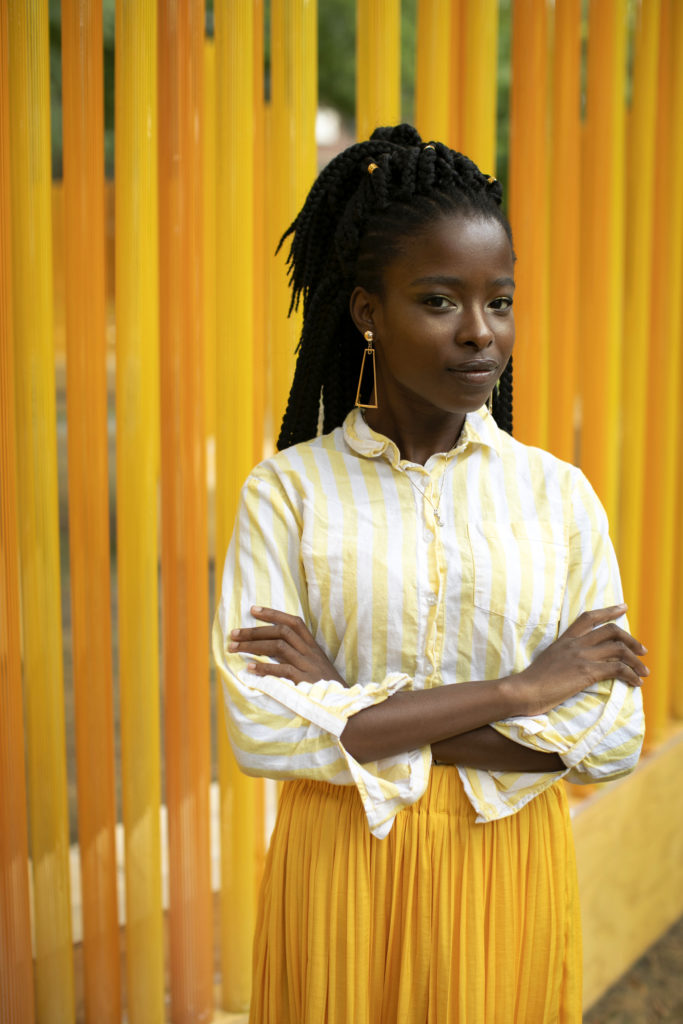
By the time Los Angeles native Amanda Gorman was in middle school, she had already written her first novel. The 21-year-old poet recalls writing in one form or another for as long as she can remember, but her career path became solidified when she realized her third grade teacher was a published author. “Being able to look at a woman and see that what I loved to do could actually be a career was eye-opening,” she explains. This important instance of representation would come to be one of the driving forces behind Gorman’s unwavering work ethic and activist ethos as a champion for America’s unheard young voices.
As she was growing up in the cultural melting pot of L.A., Gorman’s poetic outlook flourished: “From a young age, it meant I was exposed to the incredibly diverse tapestry of voices that have influenced the artistic culture of the West Coast.” In 2014, she became the city’s inaugural youth poet laureate at the age of 16, and went on to publish her first book of poems, The One for Whom Food Is Not Enough, the following year. Even as a teenager, Gorman’s poetry tackled weighty issues like oppression, marginalization, feminism, and the African diaspora with wisdom and insight that proves age really is just a number.
Become an S Insider
The latest in fashion, beauty, design, and arts & culture.
Gorman is often lauded as America’s next great figure in poetry, so it only makes sense that a complex commitment to nationalism courses through her work, too. As a representative of the country, she performed her poetry on a massive scale in celebration of Independence Day, was the first youth poet to commence the literary season for the Library of Congress, and even has her poem “In This Place (An American Lyric)” displayed in New York City’s Morgan Library and Museum—the latter of which piques a particularly triumphant note within her. “I always have an internal celebration when my poetry, as unapologetically black and female as it is, can sit beside works and institutions that represent a completely different sociopolitical time,” she reflects. “I love the idea of my work existing in the rooms which hitherto have been white, male, and pale.”
This kind of high-level representation comes at a crucial time, as the U.S. is currently undergoing what Gorman describes as a regression on values of freedom and equality. Her antidote is to write—and ultimately perform through spoken word—poems such as “Believer’s Hymn for the Republic,” which invites her audience to reflect on the shortcomings of the nation’s founding fathers and strive to correct them, “to complete and improve the American project that they began.” As always, her message is powered by hope, not hate, which has so far proved to go a long way in her short but illustrious career as a champion for change.
Aside from her poetic prowess, Gorman is also an accomplished speaker, New York Times contributor, and the founder of a non-profit organization for youth literacy and leadership; on top of that, she is now adding children’s book author to the list. Her debut picture book, Change Sings, is set to be published in 2021 through Viking Books, an imprint of Penguin Young Readers, and is imbued with the same optimistic call to action that runs unbridled throughout her work. “The message of the children’s book is about the role young people have in shaping all of our collective future,” she explains. “I hope it can inspire children to reflect on their own potential to make change.”
An exemplar of multitasking, Gorman is currently finishing her senior year at Harvard, where she is studying sociology, and has her sights ambitiously set on running for president in 2036. In addition to it being the program studied by her role model (“the queen”) Michelle Obama, Gorman chose this particular area of study because it provides the tools to understand how change is realized on a historic level. As for her advice on making even the most aspirational goals a reality? The answer, much like her approach to achieving her dreams, is forthright and direct: “I always say, define your dreams or someone else will define them for you. I’m a true believer in being explicit about what you want for your own future and those around you.”
For someone who has accomplished by the age of 21 what one might hope to achieve across a lifetime, Gorman has remained incredibly humble. And while the concrete accolades are certainly worth celebrating, she will be forever fuelled by the positive impact her poetry has on those who interact with it. Although far more difficult to document or measure, these inspired connections with America’s youth resound the loudest. “I believe the greatest achievements come from leaving some type of small imprint on a young, powerful soul,” she imparts. “That is no small feat.”

